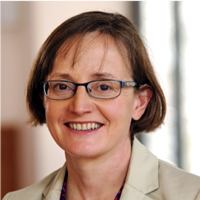
NSF AD for CISE Margaret Martonosi Video on the Importance of Departmental BPC Plans
Listen to NSF AD for CISE Margaret Martonosi discuss the importance of Departmental BPC Plans in this new video.
The CRA Bulletin frequently shares news, timely information about CRA initiatives, and items of interest to the general community.
Subscribe to the RSS feed to stay connected.
Several activities sponsored by CRA and other organizations are designed to increase diversity in the computing field.

Listen to NSF AD for CISE Margaret Martonosi discuss the importance of Departmental BPC Plans in this new video.
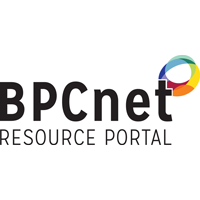
The Computing Research Association (CRA) and the National Science Foundation’s (NSF) Directorate for Computer and Information Science and Engineering (CISE) are calling upon the academic community to create and submit Departmental BPC Plans to BPCnet.org.
Departmental BPC Plans are important because they help departments:
Undergraduate computing departments have long suffered from issues related to diversity, equity, and inclusion (DEI). However, there has been, to date, no large-scale effort that focuses on addressing issues of systemic racism and bias that directly impact not only students from minoritized groups, but also faculty (as issues of race, gender, and intersectionality impact hiring, […]

The National Science Board (NSB) has named computer scientist and disability advocate Richard Ladner as the 2020 recipient of its Public Service Award. This award is granted to individuals and groups that have contributed substantially to increasing public understanding of science and engineering.
CRA is dedicated to creating an environment that is more welcoming, just, and equitable to all. In the Communications of the ACM article, “CS Teachers, It’s (Past) Time To Learn About Race,” Mark Guzdial encourages CS teachers to make changes to CS education that ensure everyone is welcome and supported.
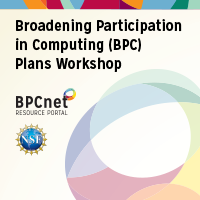
The Computing Research Association (CRA) is hosting the second workshop in its series of Departmental BPC Plan workshops on August 6-7, 2020.
In this workshop, academic departments will learn about the NSF CISE requirements and expectations for BPC Plans. The workshop will also cover in-depth discussions on BPC Plan components, have BPC experts available for Q&A, and provide time for departments to discuss ideas and make future plans. Following the workshop, participants will have the opportunity to receive additional feedback as they continue to develop and refine their plans.
CRA is dedicated to creating an environment that is more welcoming, just, and equitable to all. Many want to take action in this area but are not sure how. Manuel A. Pérez-Quiñones wrote an article, “What Can CS Departments Do?” detailing a set of recommendations for computing departments to improve inclusiveness: Some of my recommendations […]
CRA is dedicated to creating an environment that is more welcoming, just, and equitable to all. Last month, the Black in Computing group and Allies put out “An Open Letter & Call to Action to the Computing Community” with a curated list of actionable items.

To support departments developing a Departmental BPC Plan, the Computing Research Association (CRA) will host a series of workshops funded by NSF. The first two workshops in this series will be held virtually on July 13-14, 2020 and August 6-7, 2020.
These two workshops will present the same content on BPC plans, and include hands-on activities and real-time feedback for writing these plans. At the end of the workshop, the participants will have their own draft Departmental BPC Plan. Following the workshops, the participants will also have the opportunity to receive additional feedback as they continue to refine their BPC plans.

CRA-WP is honored to present the recipients of the inaugural Skip Ellis Early Career Award and the 2020 Anita Borg Early Career Award. Tawanna Dillahunt of the University of Michigan and Michel A. Kinsy of Boston University have been selected as the Skip Ellis Early Career Award recipients. Olga Russakovsky of Princeton University has been selected as the Anita Borg Early Career Award recipient.
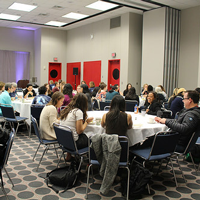
CRA-WP is excited to announce that the deadline for the 2020 CRA-WP GHC Research Scholars has been extended to May 15, 2020.
Encourage an undergraduate student to apply for an opportunity to attend the 2020 Grace Hopper Celebration (GHC 20)!
Program Description: This CRA-WP program provides guidance to research-interested undergraduate women to navigate the vast offerings at the Grace Hopper Celebration Conference (GHC) and opportunities to meet and interact with students and mentors with similar interests in small-group settings. The program will include gatherings on the first and last days of GHC, as well as research-focused activities that all Research Scholars will be required to attend.
Learn More & Apply Today: http://bit.ly/2020GHCRS
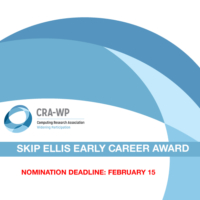
The Computing Research Association is pleased to announce its newest award, the Skip Ellis Early Career Award, which will recognize outstanding scientists and engineers with exceptional potential for leadership in computing. The award joins the Anita Borg Early Career Award for Women in advancing excellence and equal opportunity in computing research. Nominations for the inaugural Skip Ellis Early Career Award are now open and will close on February 15.
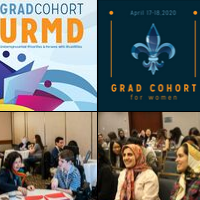
At the 2019 Grad Cohort for Women Workshop, more than 400 graduate students spent two days building both professional and support networks, while also attending sessions on how to succeed in graduate school. In three new videos, students, speakers, and sponsor representatives share their thoughts on the program’s impact. Check out these three 2019 Grad […]
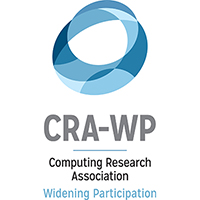
It is with great excitement that we share with our friends, colleagues, and broader computing community that CRA Committee on the Status of Women in Computing Research (CRA-W) is now officially CRA Committee on Widening Participation in Computing Research (CRA-WP).

CRA recently published two videos on the 2019 Grad Cohort for URMD – one targeted at sponsors and the other targeted at potential attendees. In both videos, students, speakers, sponsor representatives, and CRA Director of Programs Erik Russell share their experiences, the impact it has and the benefits it delivers to sponsors.

This November, the University of Illinois at Urbana-Champaign will host Rising Stars, an academic career workshop for women in EECS. At this workshop, female graduate students and postdocs who are interested in faculty careers will learn how to navigate academic life while meeting new mentors and peers. This year’s event, to be held in Urbana, IL during Oct. 29-Nov. 1, 2019, will bring together more than 60 top young women in EECS for two days of research presentations, poster sessions, and candid discussions about navigating academic life.

A recent Forbes article written by Maria Klawe, president of Harvey Mudd College and a former CRA board member, addresses “Why We Need Inclusive Teaching In Every Classroom.” In the article, Klawe interviews Colleen Lewis, a computer science professor at Harvey Mudd, about Lewis’ work to develop, incorporate, and disseminate inclusive teaching practices. Lewis researches […]
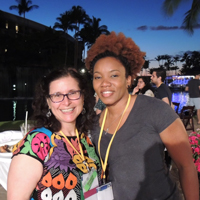
On March 22-23, CRA hosted the second annual Graduate Cohort for Underrepresented Minorities and Persons with Disabilities (URMD Grad Cohort) in picturesque Waikoloa Village, Hawaii. The location provided beautiful scenery as students spent two days learning how to succeed in graduate school and networked with a diverse group of peers and senior researchers.

In partnership with the National Science Foundation (NSF) and the National Center for Women in Information Technology (NCWIT), CRA announces an initial launch of BPCnet.org, a resource portal designed to amplify the NSF CISE Directorate’s efforts in broadening participation in computing (BPC). CRA anticipates that BPCnet.org will provide a much-needed clearinghouse for the community to learn about and engage with ongoing projects to diversify computing.
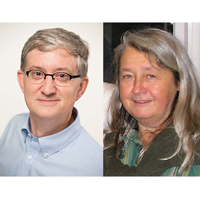
The CRA board of directors is pleased to announce its selections for the 2019 CRA Awards.
Edward Felten – Distinguished Service Award Winner
Maria Gini – A. Nico Habermann Award Winner

This CRA-W program provides guidance to research-interested students on how to navigate the vast offerings at the GHC conference and opportunities to meet and interact with students and mentors with similar interests in small-group settings

The organizers of the 2018 CRA Conference at Snowbird session, “Increasing Diversity in Computing is Easier Than You Think: Some Small Steps that Make a Big Difference,” recently published a list of 10 small steps departments can take to increase diversity at their institutions.
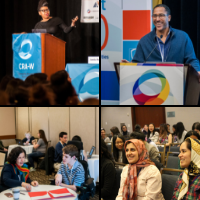
We will again host two Graduate Cohort Workshops in 2019. The CRA URMD Grad Cohort Workshop is designed specifically for underrepresented minorities in computing and persons with disabilities in graduate school in computing fields. The CRA-W Grad Cohort Workshop is designed for women students in their first, second, or third year of graduate school in computing fields. The workshops will include a mix of formal presentations, informal discussions and social events. By attending Grad Cohort, participants will be able to build mentoring relationships and develop peer networks that are intended to form the basis for ongoing activities during their graduate career and beyond. Both applications are open now and will close on November 15.
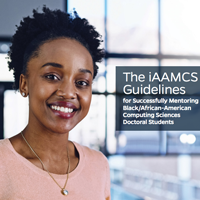
These guidelines were established to articulate successful strategies for mentoring African-American doctoral students in Computing Sciences (CS). iAAMCS defines “student mentoring” as the process of supporting, encouraging and guiding students’ academic and social progress with the goal of facilitating career and personal development. Grounded in project-based results and similar empirical research, the following guidelines emerged: (1) recruit strategically, (2) establish community, (3) foster a research culture, (4) provide holistic advising, (5) provide funding and (6) promote professional development. iAAMCS hopes that institutions, departments and faculty use these guidelines to bolster the participation of African-American students pursuing doctoral degrees in CS.
Although the iAAMCS Guidelines serve as best practices for mentoring African-American students in computing, these strategies are useful for optimal mentoring all students.
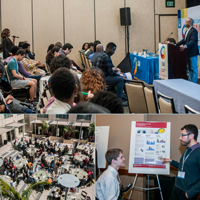
Listen to what participants have to say about the inaugural CRA Graduate Cohort for Underrepresented Minorities and Persons with Disabilities (URMD Grad Cohort) in this recently released video.

Stuart Reges’ recent article entitled “Why Women Don’t Code” elicited strong reactions. I am a colleague of Reges’ in the Paul G. Allen School of Computer Science & Engineering at the University of Washington (UW). Like a number of my colleagues, I found myself surprised and troubled by his article.

CRA and CRA-W Board Member Ayanna Howard was recently named the recipient of the 2018 Richard A. Tapia Achievement Award for Scientific Scholarship, Civic Science and Diversifying Computing from the Center for Minorities and People with Disabilities in Information Technology (CMD-IT). “The Richard A. Tapia Award is awarded annually to an individual who demonstrates significant research leadership and strong commitment and contributions to diversifying computing.

For the past 30 years I have had two passions – machine learning (ML) that makes a difference in the real world and increasing diversity in computer science (CS). For the first 26 years, I focused on my first passion and developed new approaches to ML though applications to remote sensing, neuroscience, digital libraries, astrophysics, content-based image retrieval of medical images, computational biology, chemistry, evidence-based medicine, detecting lesions in the MRIs of epilepsy patients, and predicting disease progression for MS patients. For the last four years, my focus has been on my second passion: increasing diversity in CS.
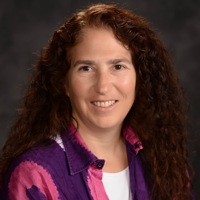
Recently, Nancy Amato, a robotics expert and CRA board member, was selected to lead the University of Illinois Department of Computer Science. She will be the first woman to hold this position at the University.
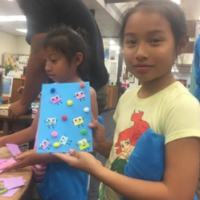
The National Girls Collaborative Project (NGCP) brings together organizations throughout the United States that are committed to informing and encouraging girls to pursue careers in science, technology, engineering, computer science, and mathematics. NGCP serves more than 35,000 programs in 41 states and uses a collective impact model that builds the capacity of educational programs.
